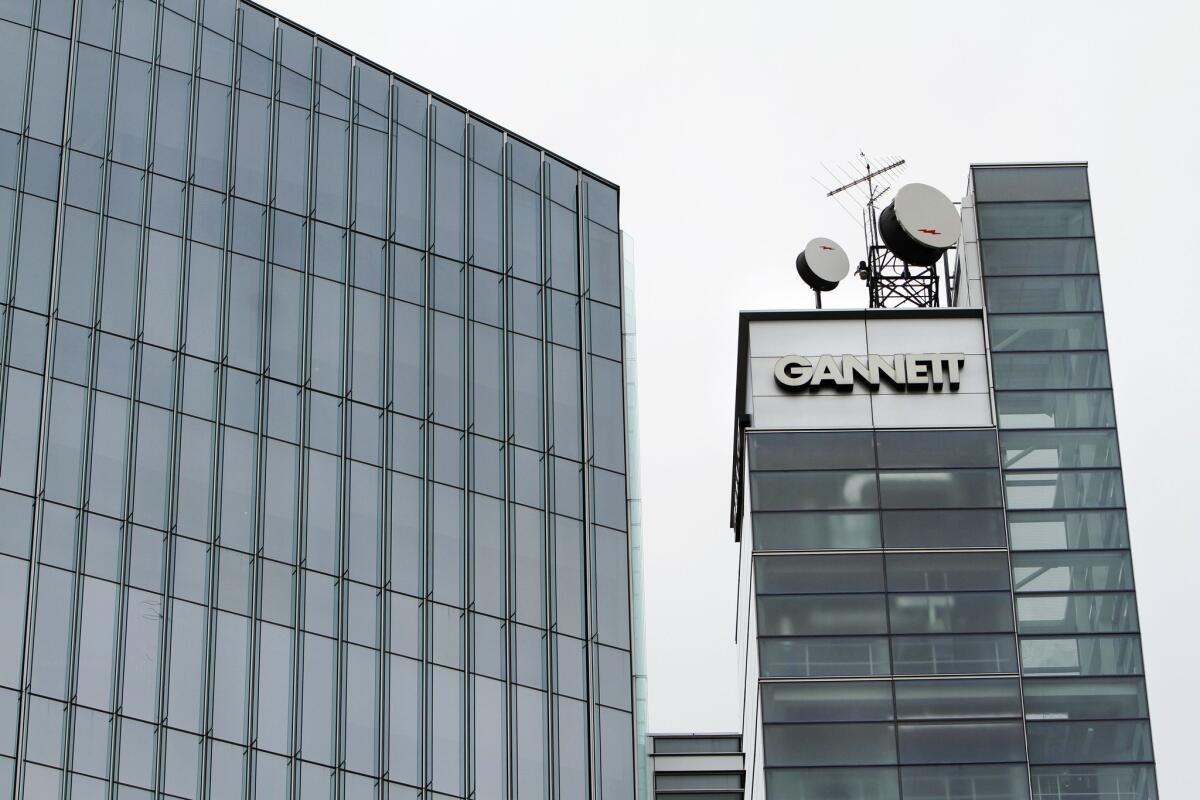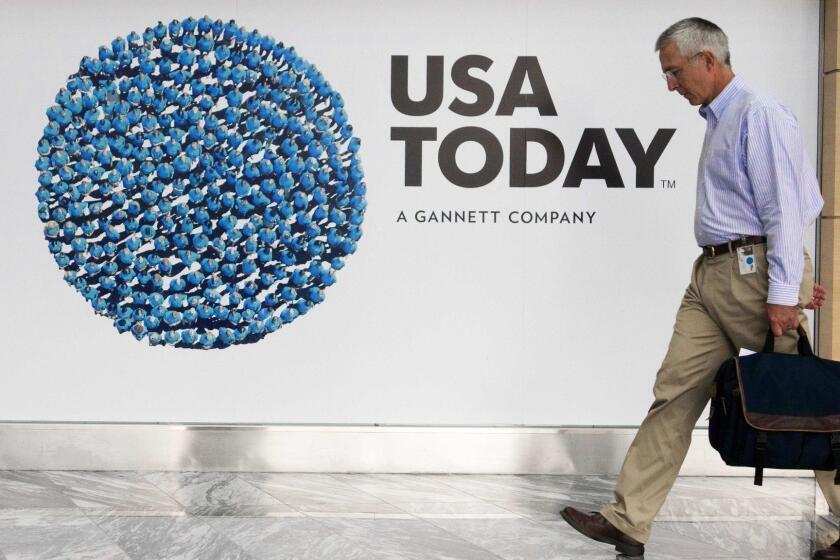The future for local news looks bleak

- Share via
The merger of the big newspaper chains Gannett and GateHouse Media, which became final Tuesday, will create a “stronger” and “more viable” print and digital news enterprise “with deep local roots and national scale.”
That’s the optimistic view mouthed by Michael Reed, the CEO of New Media Investment Group, GateHouse’s parent, on Nov. 14 after the deal was approved by shareholders of both companies.
One would hope so, since the news business could use an injection of optimism these days. Perhaps there are grounds for hope, since the “new Gannett,” as Reed dubbed the combination, will have national-scale heft, creating the largest newspaper chain in the U.S., encompassing 263 daily news organizations.
Since 2008, there hasn’t been a single year of revenue gain in the newspaper industry as a whole.
— News industry analyst Ken Doctor
But there may be just as much reason for doubt. The economic environment of local news continues to become more dismal as print advertising disappears and managements struggle to raise digital advertising and subscription fees enough to take up the slack.
Advertisers have many online platforms to reach customers, and the vast majority of remaining newspaper readers are in the aging demographic that digital advertisers don’t much care for.
“Since 2008, there hasn’t been a single year of revenue gain in the newspaper industry as a whole,” says veteran industry analyst Ken Doctor. That’s produced a strategy of “continuous cost-cutting for more than a decade in local news.” The cuts have come heavily in the form of layoffs at media companies of scores or hundreds of workers at a time.
The merged Gannett and GateHouse may not diverge from the trend; Reed has said that he expects to wring as much as $300 million in “synergies” from the combination, but that may be hard to do without more shrinkage in the workforce. Earlier this year, GateHouse reportedly laid off more than 60 employees (the company would not disclose the actual number but called it “immaterial”) and Gannett reportedly laid off several hundred.
Among those who believe that the press provides value for society — especially local journalism that slaps state and municipal politicians’ hands out of the public cookie jar — Alden Global Capital is a “vulture investing” firm that makes real vultures look good by comparison.
The private equity firm Alden Capital, which owns the Orange County Register, Denver Post, San Jose Mercury News and more than 90 other publications and boasts a reputation as a pitiless parer of payroll, has attracted much of the publicly expressed ire over wholesale plundering of local news resources — with good reason, for Alden publications have been cutting staff at about twice the rate of the industry as a whole.
(Alden on Tuesday announced that it had become the largest shareholder of Tribune, the former owner of The Times, by acquiring the entire 25.2% stake held by Tribune’s former chairman, Michael Ferro, for $13 a share or $117.9 million.)
But public companies such as Gannett, GateHouse and also McClatchy Co. can’t escape the industry’s economic challenges.
Sacramento-based McClatchy, a chain of 30 newspapers including the Sacramento Bee, Miami Herald and Kansas City Star, may be another canary in the news industry’s coal mine. McClatchy reported a loss of $304.7 million on revenue of $167.4 million in the third quarter ended Sept. 29. Most of the loss reflected a write-down of the company’s news assets.
But the company also reported long-term debt of more than $700 million. McClatchy said its finances were so impaired that it wouldn’t have the cash or cash flow to make a required minimum contribution of $124 million to its pension fund next year and was negotiating a possible takeover of the plan by the government’s Pension Benefit Guarantee Corp.
McClatchy’s parlous condition has sent it on a quest for a merger partner. In December, the firm bid $16.50 per share for Tribune, the owner of the Chicago Tribune, New York Daily News, Baltimore Sun and Hartford Courant, and the former owner of The Times. But the offer fell short of the $20 reportedly demanded by Ferro, who was then Tribune’s largest shareholder.
The owner of the Los Angeles Times has a new name and a newly elected board, but it’s still dealing with some old business: dissatisfaction from some shareholders with its decision to spurn a buyout offer from rival Gannett Co.
That said, the two companies might have made a good fit, as Tribune’s large-market publications would have balanced McClatchy’s stable of smaller metro newspapers.
Tribune, moreover, may have the best balance sheet in the industry, having paid down most of its long-term debt with the proceeds of Dr. Patrick Soon-Shiong’s purchase of The Times and the San Diego Union-Tribune for $500 million. That deal closed in June 2018; Soon-Shiong remains a major shareholder of Tribune, with 24.4% of the company as of March 20.
Indeed, Doctor asserts that talks have resumed between McClatchy and Tribune. Both companies declined to comment on the assertion.
The most important question raised by the ostensibly synergistic consolidation in the news industry represented by the acquisition spree of firms such as Alden and the Gannett-Gatehouse merger is what the owners will do with any savings they extract. For almost any news organization looking to the future, the imperative is to invest in digital capabilities, since that’s where the news audience has been moving to.
GateHouse hasn’t been known for such investment. According to a 2018 survey by Penelope Muse Abernathy of the University of North Carolina, the firm’s practice after acquiring a newspaper has been to “consolidate copy editing and page design” at a corporate center, then replace veteran and specialty reporters with younger (and cheaper) general assignment reporters. “GateHouse-owned newsrooms are often half the size within a matter of months,” Abernathy reported.
Reed, who will be the merged company’s chairman, told investors of New Media, the GateHouse parent, on Oct. 31 that the merger would allow the company to quickly pay down debt and “to return capital to shareholders through dividends, in addition to investing for growth that will drive revenues.” It shouldn’t escape notice that it’s not always easy to reconcile using cash to pay shareholder dividends with “investing for growth.”
Freelance writers and photographers fear California’s new gig worker law will make them unemployable.
The increasingly common pattern is to operate local newspapers as sources of plunder. At GateHouse, for example, the Gannett deal will enrich Fortress Investment Group, a private equity firm that created GateHouse and remained as a major player in the company through an initial public offering and a bankruptcy, and currently runs GateHouse through a management contract.
Fortress will give up the management contract at the end of 2021, but will leave with a payout that New Media investor Leon Cooperman blasted on an investor conference call as “morally wrong.”
“I know we’re happy to get rid of Fortress,” Cooperman told Reed. “They brought this public in 2014 at $16 a share. The stock is $8.5 and they’re going to walk away with hundreds of millions of dollars. ... They shouldn’t even take the money, given what they’ve done here.” (Cooperman is the billionaire investor who recently tangled with Elizabeth Warren over her proposal for a wealth tax.)
Plunder can work as a short-term money-making strategy in an industry that remains profitable while tracing a glide path to extinction. “Financial players like Fortress and Alden are making significant money on the way down,” says Doctor. “They see the way down as close to inevitable.”
In the news business that’s a self-fulfilling strategy, however. Public companies such as Gannett and McClatchy have resisted such fatalism. They have imposed sharp cuts on some of their local publications and cut back on physical delivery — McClatchy is planning to end Saturday publication of all its newspapers by the end of next year, though it will post new articles online. But they also have invested in investigative reporting and other national-level efforts, as well as digital initiatives.
As traditional revenues continue to decline — and at an ever faster pace — those companies find themselves in a vise. Making the transition to digital news requires resources that may be harder to come by. Meanwhile, Doctor says, they’re trying to buy time through shrinkage even as their ultimate destination remains unclear.
“After two more years of this,” Doctor asks, “what kind of products are going to be left in local communities that readers feel are worth a digital subscription? What’s your strategy after all the cost-cutting?”
More to Read
Inside the business of entertainment
The Wide Shot brings you news, analysis and insights on everything from streaming wars to production — and what it all means for the future.
You may occasionally receive promotional content from the Los Angeles Times.














